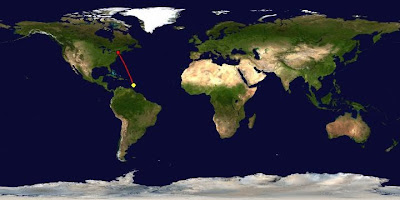Do Americans not understand the difference between “innocent” and “not guilty” in US jurisprudence?
For those of you who were very fortunate enough to miss it, there was a trial of a young mother in Florida named Casey Anthony, accused of the murder of her two-year-old daughter three years ago. It was a lurid affair, with the defendant accusing her father and brother, in open court, of sexually abusing her, which somehow was the explanation why it took a month before little Caylee was reported missing.
Considering the fact that I was blissfully oblivious to the case before the trial, I know a great deal (more than I want to) about it. Literally, fights broke out in the lines among the spectators wanting to see the event.
Then lo and behold, Casey Anthony was found “not guilty” of the most serious accusations against her. And people, including virtually all of the media, were SHOCKED by the outcome. ABC News did a prime time hour on the SHOCKING results.
#SHOCKING was the hashtag on Twitter the day of the verdict. One of the morning news shows (The Today Show on NBC?) had mothers explaining why Caylee Anthony’s failure to receive “justice” was an affront to motherhood or something; I saw the tease and changed the channel. And people outside the courthouse looked ready to lynch Casey Anthony. Her parents have received death threats, not just from social media.
So does any of this matter, other than to the little victim? I contend it does, for these reasons:
One needs to ask how do some legal cases become national news, while others do not. There have been other incidents of children murdered, killed by their parent, even by their mother, which didn’t warrant more than a mention on the AP wire, if that. What role did the victim’s age, race, gender play in this story, and other situations of abductions and murders, becoming international news?
What part did the news media play in creating the expectation that this woman would be found guilty? This was a death-penalty case, and without getting too complicated, there were two paths, it was heavily reported, by which she could be executed. Surely, this left the impression that the jury would SURELY choose one or the other.
Did the news organizations pay for access to the participants? ABC News, for one, had family photos and videos, “licensed” for use. And guess what? The family members were available for “exclusive interviews”, which reeks of checkbook journalism. They also used HLN’s Nancy Grace as an “analyst” on Good Morning America, a person so buffoonish that she had been caricatured on the former ABC drama Boston Legal years ago.
Finally, the jury felt there was “reasonable doubt”, that she was “not guilty”, not necessarily “innocent”. Do Americans not understand the difference in US jurisprudence? Didn’t they watch Law & Order or LA Law or Perry Mason or countless other law fictions? (Although MAD magazine had a humorous take on this.) I believe there is something called “guilt not proven” in other countries. Maybe we need something like that here.
What are your thoughts?





